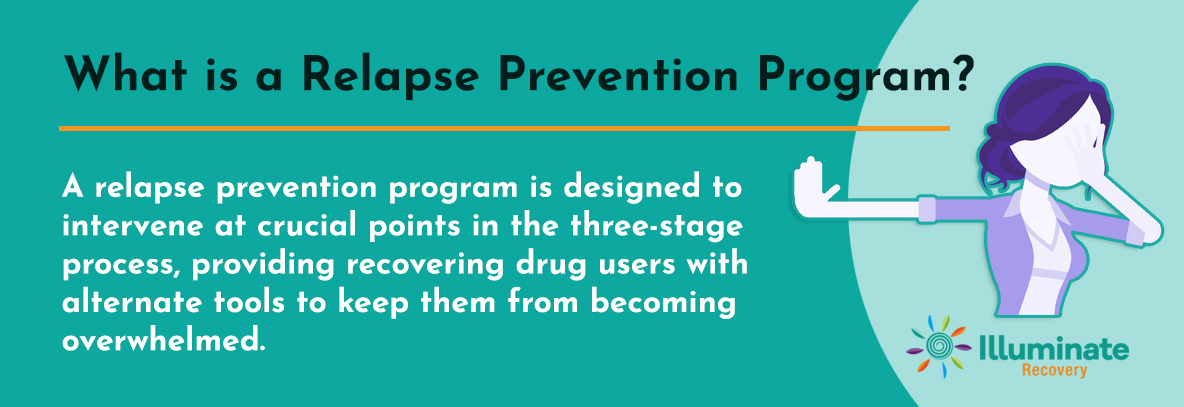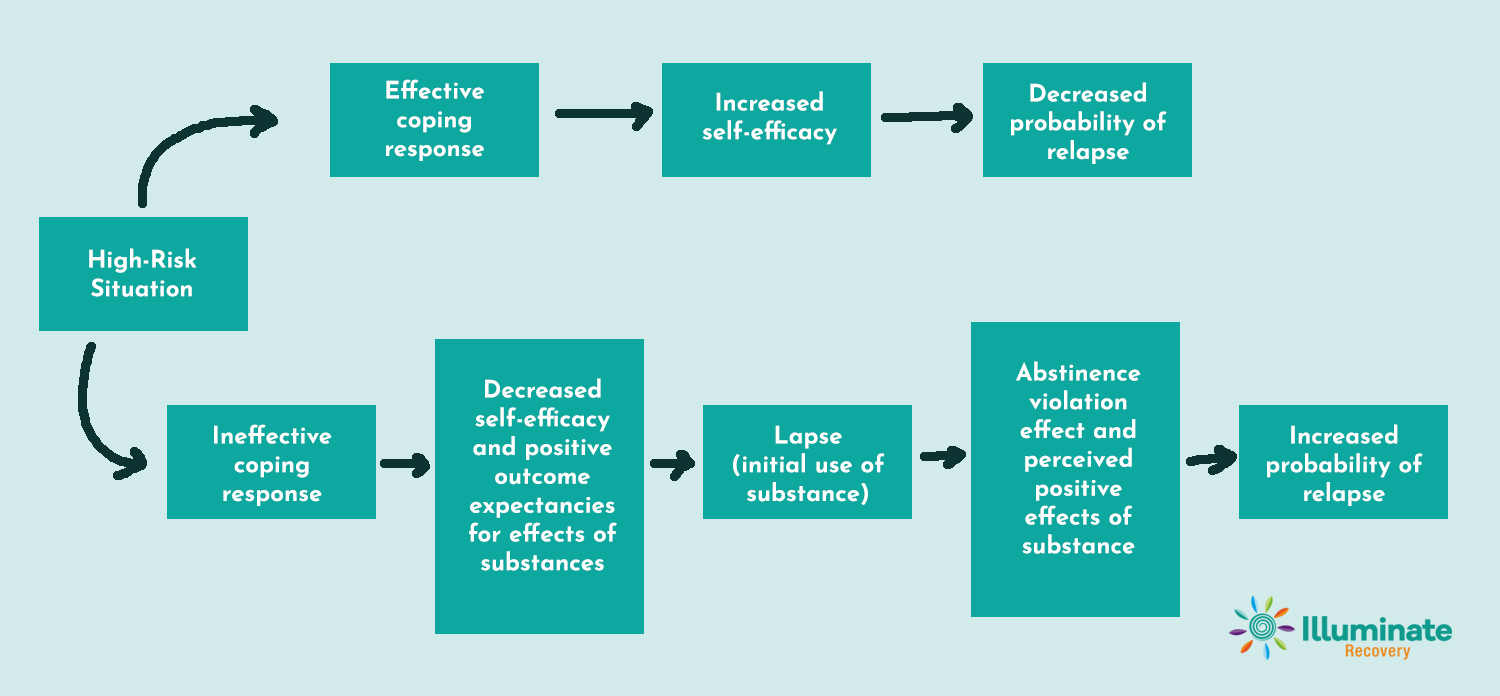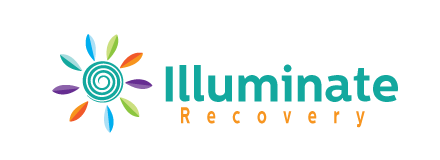Addiction Relapse Prevention Program
Learn About the Components of a Relapse Prevention Plan
Relapses are an unfortunate, but common aspect of the addiction recovery process. While there are ways to get back on track after experiencing a relapse, it is still a significant setback. It can make the individual seeking sobriety feel like they are simply unable to do so. Relapses are also dangerous because they carry an increased risk of overdose, as drug users fail to account for their newly lowered tolerance. That’s why it’s vital to prevent relapses from taking place whenever possible, despite all the challenges involved.
Relapses usually occur when a person in recovery is subject to increasingly negative emotions, stress, and negative triggers. To successfully prevent a relapse, you need to find alternate ways of dealing with those feelings and experiences without relying on drugs. At Illuminate Recovery, we have established an addiction relapse prevention program to do exactly that. Our program helps those going through the recovery process by demonstrating how replacing unhealthy behaviors with better coping habits can empower them to channel their frustration into something positive.

What Is a Relapse?
The term relapse is generally used to refer to the specific action of indulging in drug use after going through a period of abstinence with the intent of pursuing sobriety. However, relapsing usually occurs in a series of stages. The process begins with emotional unbalancing, marked by increased anger, frustration, and stress, along with self-isolation and changes to sleeping and
eating habits. If these issues go unaddressed, the person progresses into a mental stage. At this point, they begin to contemplate resuming drug use as a way of dealing with all of the unwanted turmoil. Finally, this mentality can lead to the third stage, where the person physically indulges in the act of using drugs. About half of the people in recovery from drug dependency relapse within their first year.

What are Relapse Prevention Programs?
A relapse prevention program is designed to intervene at crucial points in the three-stage process, providing recovering drug users with alternate tools to keep them from becoming overwhelmed. Programs might involve a combination of different types of one on one therapy and group activities over the course of several weeks.
During this process, patients learn how to recognize the signs that indicate they’re at risk of relapse, as well as how to handle those signs when they appear. Some programs are inpatient, meaning the patients are required to stay onsite during the duration. Other programs allow them the freedom to continue going about their lives while they participate in scheduled sessions a certain number of times per week. While each program’s details vary from institution to institution, the overall purpose is the same: helping patients regain control over their lives and preventing a relapse.
How Do Relapse Prevention Programs Work?
While building a strong foundation of knowledge in regard to what relapses are and how they work is important, the most critical component of a successful relapse prevention program is in teaching patients to recognize when they’re experiencing an emotional or mental relapse. Prevention programs should arm them with healthy coping mechanisms. These will serve as alternatives to drug use so that that no longer becomes the immediate solution to every problem
What Makes Relapse Prevention Planning at Illuminate Recovery Unique?

Generally speaking, our program seeks to accomplish the same goal as any other, assisting people going through the recovery process in effectively avoiding any risk of relapsing. However, our perspective on the issue and our strategy for success are entirely unique.
Customized, Flexible Services
As an outpatient rehabilitation center, we pride ourselves on offering extremely flexible services that will meet your individual needs, rather than sticking to a one-size-fits-all approach. Our goal is to empower you to learn how to manage your symptoms and stressors independently via a
fully customized addiction care plan. Such a plan means that, regardless of whether you encounter them within the first year or five years in the future, you will successfully avoid relapsing.
An Evidence-Based Framework
We use evidence-based modalities and strategies. These materials have proven to be an excellent source of information for those struggling to identify what sorts of situations could be detrimental to the recovery process, establishing a solid baseline. When people initially think of triggers, they tend to imagine things directly associated with their prior drug use. However, any number of things could serve as a trigger if they put you in a negative mental state. Triggers could include events at work, drama within the family, experiencing sudden physical pain, and more.
Because the details can vary to such a degree, learning to use appropriate vocabulary to correctly label the contributing factors to a relapse is necessary to ensure effective communication, allowing us to have more in-depth conversations with patients. Once they are able to confidently recognize what sorts of scenarios and behaviors might be detrimental to their recovery, we can then create a customized plan of action based on the patient’s individual needs and triggers.

Replacing Unhealthy Behaviors with Better Coping Habits
There are several behavioral modification strategies that can be applied depending on the individual, as each person responds best to different sorts of activities. Coping mechanisms could involve focused breathing, engaging in a burst of physical activity, having a conversation with someone supportive, and more. The key is in figuring out what works best for you, and at Illuminate Recovery, we have years of experience doing just that.
As patients learn how to harness these tools, we also provide them with a powerful support system they can reach out to any time they’re starting to feel like they’re unable to handle the symptoms on their own. During these communications, we can help them acknowledge what they’re experiencing and lead them through guided sessions where they can practice applying the coping mechanisms.
Modifying Negative Behaviors and Thought Patterns
Eventually, these strategies will contribute to a more permanent form of behavior medication. Instead of focusing solely on external triggers, patients will learn how to identify and deal with
internal triggers as well. Internal triggers could be patterns of negative behavior, fear of uncertainty, doubts of any chance of success, and more. When exposed to negative stimuli, patients will demonstrate the ability to develop healthier responses. This ability suggests that while they will still have coping mechanisms available as a last resort, the application of such mechanisms will no longer be necessary for every uncomfortable incident.

Prevent a Relapse with Illuminate Recovery
Whether you have never experienced a relapse before and would rather keep it that way or have experienced several and are looking for a more effective solution, Illuminate Recovery can help.
We can work directly with you to determine exactly what sorts of triggers and stimuli could aggravate the situation, and we’ll help you discover healthy ways of channeling any anger, frustration, or anxiety that accompany them. With our help, you will be able to address any issues before they deteriorate into a physical relapse.
If you have any questions about our services or are looking to get started, please call anytime or fill out our confidential online form. A member of our team will be in touch with you shortly.
Join our email list for recovery industry changes and news
Reach Out
For the best individual and group therapy for addiction in Arizona, please reach out today and speak with a treatment advisor. Call right now with any questions about our team, our therapies, or our programs. We have treatment advisors ready to take your call.
